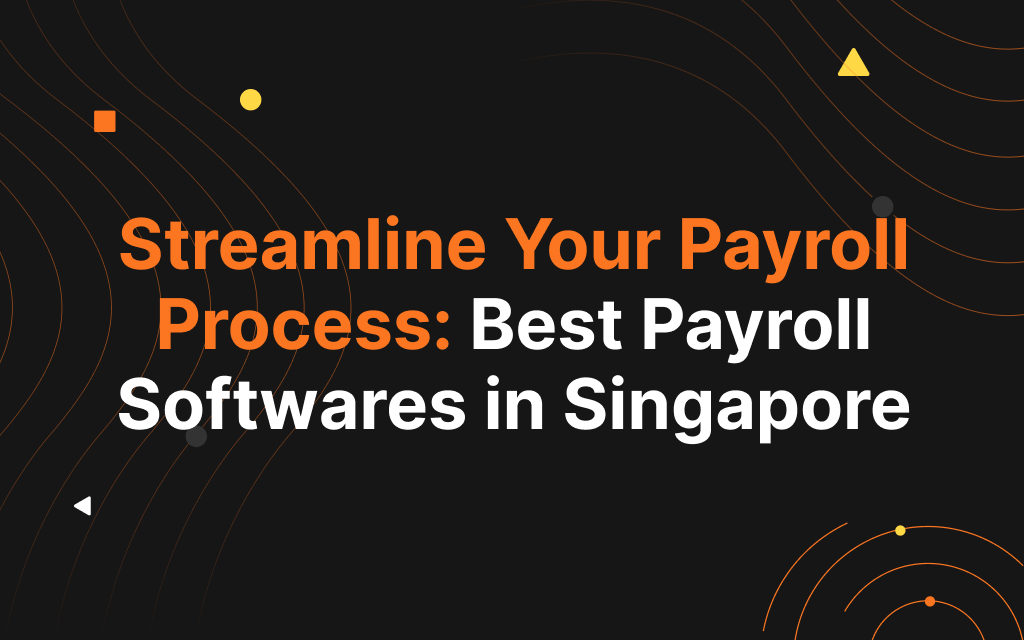In the fast-paced world of business, staying ahead can be tricky. Singaporean companies now look to enterprise resource planning (ERP) services as a beacon for optimising operations.
Dive into this guide to uncover how ERP systems can transform your company’s efficiency and decision-making landscape. Read on; your path to streamlined success starts here!
Key Takeaways
- ERP systems centralise a business’s operations into one seamless process, increasing efficiency and decision-making capabilities for companies in Singapore.
- Factors crucial to choosing an ERP provider include understanding your company’s industry-specific requirements, evaluating deployment methods (on-premises vs cloud), considering add-on features for scalability, and ensuring robust helpdesk support is available.
- With proper selection and implementation of an ERP system from a reputable provider, Singaporean businesses can streamline their internal processes, reduce manual labour costs significantly, and enhance overall operational productivity.
Understanding Enterprise Resource Planning (ERP) Service
Moving from an overview to specifics, Enterprise Resource Planning (ERP) services are a game-changer for businesses striving for cohesion and efficiency.
- ERP services unify various aspects of your business into one seamless operation.
- They handle order processing, production scheduling, accounting, and customer relationship management.
- Real-time tracking of all company operations is possible with ERP systems.
- Decision-makers gain actionable insights from across the enterprise.
- Automation eliminates repetitive tasks, reduces errors, and allows staff to focus on higher-value work.
- ERP facilitates unhindered information flow between departments, promoting collaboration and productivity within your Singapore-based business.
Benefits of Implementing ERP for Your Business

Implementing ERP for your business can lead to increased efficiency, improved decision-making, and streamlined processes. These benefits can ultimately result in cost savings and better productivity for your company.
- Increased efficiency – By automating routine tasks, ERP software enables companies to focus their efforts on more strategic initiatives. This shift towards automated processes significantly reduces the risk of human error and cuts down the time spent on administrative work. With an enterprise resource planning system in Singapore, businesses can unify their operations, merging data from sales, finance, and customer service into a central hub.
- Improved decision-making – Empowering your staff with comprehensive data and analytical tools is one of the game-changing advantages that an ERP system brings to the table. When enterprise resource planning software is implemented in a business, it integrates all facets of operations, providing real-time insights into performance. This unity enables team leaders and managers in Singapore’s competitive market to make swift, informed choices that align with company objectives.
- Streamlined processes – ERP services in Singapore create smooth workflows within businesses. They centralise information, making it simpler for departments to share data and work together effectively. These enterprise resource planning systems cut down unnecessary steps, saving time and resources. Employees can access real-time insights from a single source, allowing them to make quicker decisions and focus on their core tasks rather than juggling multiple platforms.
Factors to Consider When Choosing an ERP Provider
Consider your industry-specific needs, deployment options, add-on solutions, and helpdesk support when choosing an ERP provider. These factors will help ensure that you select the best ERP service for your business in Singapore.
Industry-specific needs
Meeting industry-specific needs is a critical factor when selecting an ERP provider for your business in Singapore. It’s essential to choose a solution that caters to the unique requirements and challenges of your industry, whether it’s manufacturing, retail, healthcare, or any other sector.
By considering these specific needs, you can ensure that the ERP system integrates seamlessly with your existing processes and provides tailored functionalities to enhance efficiency and productivity within your specific industry landscape.
Deployment options
When choosing an ERP provider in Singapore, businesses have the option of selecting either on-premises or cloud-based deployment. On-premises deployment involves installing and running the software on the company’s own computers and servers, granting full control over the system but requiring higher initial investment and ongoing maintenance.
Cloud-based deployment, on the other hand, offers a more flexible and cost-effective solution where the ERP software is hosted on external servers and accessed through the internet, enabling remote access, automatic updates, and scalability based on business needs.
Add-on solutions
When selecting an ERP provider, it’s crucial to consider add-on solutions that seamlessly integrate with your existing systems and enhance user experience. These additional features should align with your business goals, offering improved capabilities to support your company’s future vision.
The right add-on solutions have the potential to streamline communication and centralise information within the ERP system, ultimately contributing to enhanced coordination among different divisions.
Helpdesk support
When considering an ERP provider in Singapore, evaluating the helpdesk support offered is crucial. From initial implementation to ongoing maintenance, responsive and knowledgeable customer support can make a significant impact on the success of your ERP system.
Look for vendors that provide 24/7 assistance, clear escalation processes for urgent issues, and comprehensive training resources to ensure your team can fully leverage the ERP solution.
Top ERP Providers in Singapore
SAP, Epicor, Oracle NetSuite, IFS AB, and other top ERP providers in Singapore offer a range of solutions to meet the specific needs of your business. Find the right partner for your enterprise by considering factors such as industry-specific needs and deployment options.
Read on to discover how these providers can help streamline your business processes and drive growth.
SAP Business One

Created by the renowned global tech company SAP, it ranks among Singapore’s top ERP systems. Specifically designed to fuel the rapid growth of small and medium-sized enterprises (SMEs), SAP’s ERP system exemplifies comprehensive business management. It encompasses finances, sales, inventory, HR, and more, making it an exemplary ERP solution.
| Category | Information |
|---|---|
| Website | https://www.sap.com/sea/products/erp/business-one.html |
| Email Address | N/A |
| Pros | Customized ERP system for small businesses, promoting growth by addressing essential business areas. It seamlessly integrates with various applications and offers mobile app accessibility for convenience. |
| Cons | The upfront costs can be high, especially when factoring in customization and annual licensing fees. It’s a better fit for smaller businesses with fewer employees, considering the pricing model. |
Epicor

Epicor stands out as a leading ERP software provider, delivering cutting-edge solutions to businesses in Singapore. With a strong focus on AI-enabled insights, Epicor equips companies with the tools they need for a digital edge in today’s competitive market. Their systems promise modern interfaces and intuitive user experiences that cater to the dynamic needs of industries.
| Category | Information |
|---|---|
| Website | https://www.epicor.com/en-sg/ |
| Email Address | socialmedia@epicor.com |
| Pros | This ERP system is designed for medium to large businesses. It includes modules like CRM, SCM, and HCM, and it offers solutions that are specific to different industries. |
| Cons | This ERP system can be a bit expensive at the beginning, and if you want to customize it, you might need to pay extra or find experts to help. |
Oracle NetSuite

Oracle NetSuite emerges as another heavyweight in the ERP landscape of Singapore. As a pioneer in cloud computing, NetSuite delivers a suite of services that cover everything from accounting to customer relationship management (CRM) and ecommerce.
This robust web-based solution is especially favored by FinTech and financial services firms for its ability to streamline operations seamlessly across borders.
| Category | Information |
|---|---|
| Website | https://www.netsuite.com/portal/home.shtml |
| Email Address | infonetsuite_ww@oracle.com |
| Pros | This ERP system is flexible and can be customized to suit various company requirements. It operates in the cloud, making it accessible and scalable. Plus, it includes an integrated CRM module for streamlined customer relationship management. |
| Cons | Using this ERP system might incur extra costs for license fees, integration, setup, and training. Also, accessing the database could be challenging as it requires specialized IT teams, limiting access for regular users. |
IFS AB

Moving on from Oracle NetSuite, another top ERP provider in Singapore is IFS AB. Known for its core strengths in project-based industries, IFS Field Service Management has received positive reviews from business users.
This reputable company has been chosen by BW Energy to drive global oilfield development and it continues to strengthen AI capabilities across automation and optimisation with IFS Cloud November Release’s introduction of IFS.ai.
| Category | Information |
|---|---|
| Website | https://www.ifs.com/ |
| Email Address | press@ifs.com |
| Pros | IFS offers versatile interfaces for integration and efficient reporting, with adaptable access management. |
| Cons | IFS needs to speed up bug fixes post-sales, and there’s a licensing gap between full and light licenses that could strain budgets during upgrades. Improving access for users in multi-domain Active Directory setups is also essential. |
Infor Cloud

Infor Cloud offers industry-specific preconfigured cloud ERP systems, which are designed for quick implementation. The platform enables seamless data flow and analysis, essential for achieving success in smart factory operations.
Infor OS, a cloud innovation platform, assists businesses in realising tangible value from their digital transformation efforts.
| Category | Information |
|---|---|
| Website | https://www.infor.com/products/cloudsuite-corporate |
| Email Address | CustomerExperienceTeam@infor.com |
| Pros | The product offers a comprehensive set of end-to-end business processes, and I particularly appreciate LN’s Process Intelligence. Furthermore, the product keeps up with the latest technology trends and even offers a SaaS version for added convenience. |
| Cons | The product necessitates multiple transactions to complete a single action, and there is a deficiency in providing full traceability from sales order to goods expedition. |
Yonyou

Yonyou, a leading cloud-based ERP solutions provider in Singapore, offers YonBIP for large companies and YonSuite for small businesses. These innovative software solutions are designed to streamline operations, manage finances, and drive growth by optimising business processes.
Yonyou emphasises the strategic importance of setting up robust ERP solutions and provides unique SaaS offerings like wholesale distribution management systems to enhance business synergy.
| Category | Information |
|---|---|
| Website | https://www.yonyou.com.sg/ |
| Email Address | enquiry@yonyou.com.sg |
| Pros | Financial and inventory management, along with production management, are efficiently handled. The platform’s robustness allows it to seamlessly integrate with existing applications. |
| Cons | There is room for improvement in the supply chain management’s security aspect, and the cloud-based solution should enhance its throughput capabilities. |
HashMicro

Moving on from the options available, now let’s look at HashMicro – a multinational software giant and market leader in ERP solutions in Singapore. With over 1750 businesses trusting their end-to-end ERP software, HashMicro utilises AI technology to meet business needs quickly and accurately.
Specialising in providing ERP solutions for various industries, including appliance service, HashMicro is focused on empowering businesses with top-tier ERP solutions and digital transformation services to boost efficiency and performance.
| Category | Information |
|---|---|
| Website | https://www.hashmicro.com/ |
| Email Address | enquiries@hashmicro.sg |
| Pros | This ERP system boasts comprehensive features and a user-friendly interface. It can be tailored to match your company’s unique requirements and workflows. Accessible via web and mobile devices, it even integrates seamlessly with WhatsApp. You’ll find it easy to integrate with your existing systems, and you’ll receive full support, including consultation and maintenance, from experienced teams. Additionally, it offers the benefit of partnering with CTC and EDG grants, potentially providing up to 50% in subsidies for your implementation. |
| Cons | Customizing this ERP system to fit your specific needs might extend the implementation timeline. Additionally, for more intricate customizations, you might need extra training to ensure a smooth transition and optimal use. |
Deskera

Deskera, a cloud-based suite of integrated enterprise management headquartered in Singapore, offers a comprehensive range of business applications such as financials, CRM, eCommerce, and manufacturing.
Being part of the nationwide electronic invoicing initiative in Singapore reflects its commitment to innovation and efficiency. Known for their customer-focused approach and active understanding of user needs, Deskera’s ERP solution is highly regarded by CIOs for superior decision-making prowess and streamlining IT infrastructure.
| Category | Information |
|---|---|
| Website | https://www.deskera.com/ |
| Email Address | hello@deskera.com |
| Pros | This integrated platform serves as a one-stop solution for managing your business. Its features encompass essential operational aspects, and it offers mobility and accessibility for seamless remote operations. |
| Cons | Keep in mind that this ERP system may have limited specific customization options, and you might need to purchase additional modules or advanced features separately if they are essential for your business needs. |
Zoho ERP Application

Transitioning from Deskera, another top ERP provider in Singapore is Zoho ERP Application. Zoho offers a comprehensive ERP solution that aligns with the specific requirements of businesses operating in Singapore.
With its diverse functionality, the Zoho ERP application covers crucial aspects such as CRM, project management, invoicing, financial management, human resources, supply chain management, and manufacturing.
| Category | Information |
|---|---|
| Website | https://www.zoho.com/creator/industries/custom-erp-software.html |
| Email Address | hello@zohocreator.com |
| Pros | This ERP system offers a user-friendly interface, making it easy to use. It also helps you coordinate with colleagues and customers efficiently. Plus, it’s an all-in-one platform for your business needs. |
| Cons | Be prepared for a potential learning curve when dealing with complex functionalities in this ERP system. Additionally, there might be compatibility issues with specific third-party applications, which could require extra attention when integrating them with the system. |
Brightpearl

Brightpearl, a cloud-based ERP system in Singapore, offers back-office automation for businesses. Users highly rate Brightpearl for its all-in-one capabilities and ease of use. It can seamlessly connect all eCommerce channels for businesses with multiple sales platforms, making it an ideal choice for companies operating across various online marketplaces.
| Category | Information |
|---|---|
| Website | https://www.brightpearl.com/ |
| Email Address | N/A |
| Pros | This ERP system provides omnichannel support for both online and offline sales, ensuring a seamless experience for your customers. It also integrates smoothly with various e-commerce platforms to streamline your online operations. |
| Cons | It’s important to note that for cloud-based operations, you’ll depend on internet connectivity. Additionally, new users might experience a learning curve when getting acquainted with the system. |
Ecount

A notable addition to the list of top ERP providers in Singapore is Ecount. This 100% Cloud-based business management programme offers a unified data set, allowing companies to efficiently manage all core business functions.
As an IRAS-approved accounting software, Ecount stands out for its flexible and scalable nature, making it suitable for businesses of varying sizes. Furthermore, potential users can access pricing, cost, and reviews on Capterra Singapore 2023 – giving them valuable insights into the software’s performance and value.
| Category | Information |
|---|---|
| Website | https://www.ecount.com/us/?redir= |
| Email Address | via Online Form |
| Pros | This ERP system is well-suited for small to medium-sized businesses with accounting needs. It provides integration capabilities with a range of business applications and plays a vital role in facilitating informed business decision-making. |
| Cons | However, it’s worth noting that this ERP system has limited functionality and doesn’t encompass the broader range of ERP modules beyond accounting. |
Sage Intacct

Elevate your business through the prowess of AI-driven continuous accounting and ERP solutions. Whether you’re a burgeoning startup or a well-established public company, rest assured, we are the ideal partner to ensure your sustained success. Our cutting-edge technology and expertise pave the way for your business to thrive in the digital age, providing you with the competitive edge you need to excel.
| Category | Information |
|---|---|
| Website | https://www.sage.com/en-us/sage-business-cloud/intacct/ |
| Email Address | N/A |
| Pros | This ERP system excels at automating accounting tasks and offers various optional modules for added functionality. It seamlessly integrates with other software applications and provides valuable resources like video tutorials and user guides for user support and guidance. |
| Cons | Keep in mind that this ERP system relies on internet connectivity for its cloud-based functionality, which may require a stable internet connection. Additionally, its limited customization options could potentially pose constraints for businesses with highly specific needs. |
Trends in ERP Software
ERP software is moving towards cloud-based deployment, integrating with other software systems, and prioritising data security – stay ahead of the curve by discovering more about these trends.
Cloud-based deployment
Cloud ERP systems are hosted on a vendor’s cloud platform, offering a more secure environment for managing corporate data. This deployment model provides enhanced scalability and flexibility, particularly beneficial to small businesses and the logistics sector in Singapore.
With cloud-based ERP, companies can ensure efficient information management while prioritising data security.
Businesses seeking ERP services in Singapore should consider the advantages of cloud-based deployment, which include improved scalability and security features to effectively manage organisational data.
Integration with other software systems
Transitioning from cloud-based deployment to the integration with other software systems, ERP services in Singapore offer seamless connectivity between various business functions. This integration allows for a smooth flow of data across departments, enhancing productivity and efficiency.
By integrating ERP with other systems, businesses can streamline processes and minimise errors by reducing manual tasks.
Additionally, integrating ERP software with other systems provides a comprehensive view of business operations, enabling better decision-making and strategic planning. With this in place, companies can also improve customer satisfaction by gaining a holistic understanding of customer interactions and preferences – key aspects when considering ERP services in Singapore.
Focus on data security
Transitioning to the critical aspect of data security, it’s essential for businesses in Singapore to prioritise safeguarding their sensitive information within an ERP system. Cloud-based ERP solutions offer advanced features such as firewalls and robust user-related settings, ensuring scalability and flexibility while maintaining a high level of data security.
Small and medium-sized enterprises (SMEs) particularly benefit from these measures within an ERP system, providing them with increased protection for their valuable business data.
SMEs seeking ERP services should recognise that integrating applications like field service management underscores the importance of securing data within the ERP system. This emphasises the significance of selecting a provider who places a strong emphasis on ensuring comprehensive data security measures are in place.
Conclusion
In conclusion, choosing the right ERP provider for your business in Singapore is crucial. Assessing industry-specific needs, deployment options, and add-on solutions will help you make an informed decision.
Consider the emerging trends like cloud-based deployment and data security to stay ahead in streamlining operations and maximising success. With successful ERP implementation, businesses can effectively reduce labour costs and enhance overall efficiency.
FAQs
1. What is an Enterprise Resource Planning (ERP) system in Singapore?
An Enterprise Resource Planning system in Singapore is a software that helps businesses manage their operations, from finance to supply chain, all within one platform.
2. How can my business benefit from using ERP services?
Using ERP services can streamline your company’s processes, improve data accuracy, and boost productivity by integrating all business functions into one comprehensive system.
3. Are there specific ERP companies in Singapore for different industries?
Yes, there are various ERP companies in Singapore that specialise in different sectors to provide tailored solutions meeting unique industry needs.
4. Can I integrate Microsoft 365 with an ERP system in Singapore?
Certainly! Many ERP systems in Singapore are designed to work seamlessly with Microsoft 365, enhancing collaboration and productivity across your organisation.







